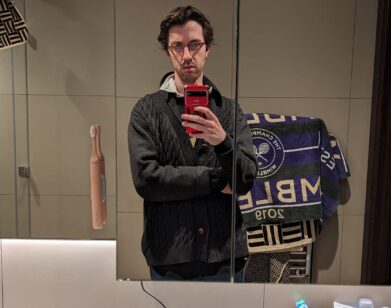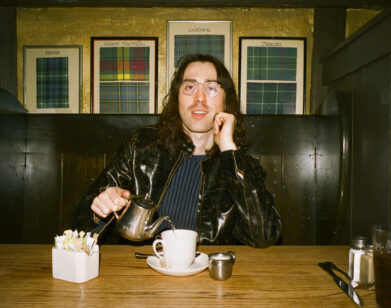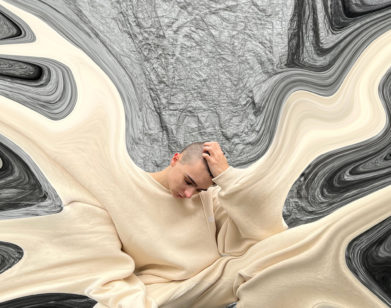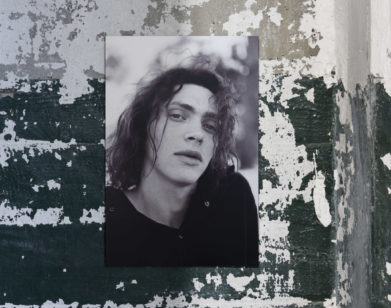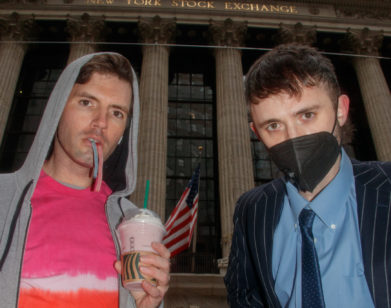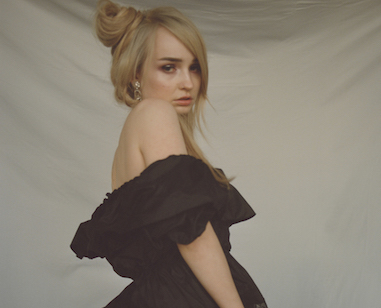Pop wunderkind SOPHIE synthesizes human and machine voices
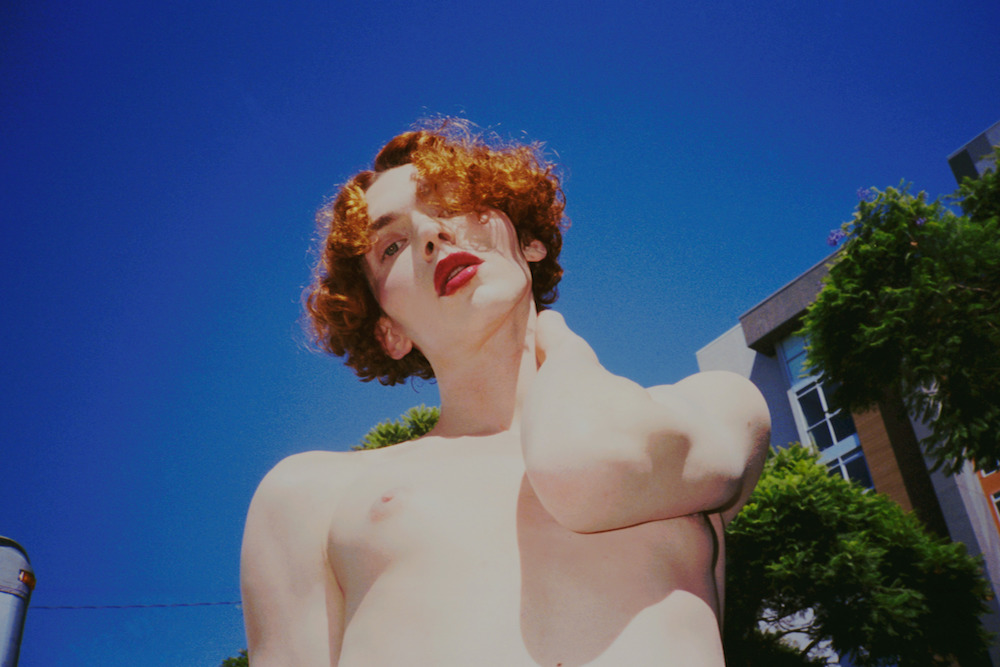
The name SOPHIE carries a touch of mystery — she’s at once known and unknown, seen and unseen. Since her first release in 2013, she’s captivated fans with a juxtaposition of grating, mechanical sounds and bubbly, high-pitched vocals. The music has often been perceived as a distortion or rejection of mainstream pop. Yet, in rare interviews, SOPHIE has clarified that her focus is on creating new expressions of emotion within pop music by exploring the relationship between the human voice and futuristic production technology.
Despite live shows and the release of a singles compilation in 2015 titled Product, little is known about SOPHIE. Today, she appears physically for the first time in a brilliant music video for her new song, “It’s Okay to Cry,” ahead of an all-new show, “Open Beta: SOPHIE Live Debut,” during Red Bull Music Academy Los Angeles next week.
CEDAR PASORI: When was the last time you did a phone interview?
SOPHIE: I don’t think I’ve ever done a phone interview. I can’t remember doing one. I did a radio piece on British radio a while ago, but I didn’t do it myself.
PASORI: There isn’t a lot that people know about your life. In the past, you’ve suggested that an artist’s biography is unimportant to the understanding of their music. Is there anything you do want people to know about who you are and your past?
SOPHIE: I make my music to express everything I feel is necessary to communicate at a given time. Through music, I can express myself with statements that are more nuanced and more contradictory than factual details.
PASORI: Today your new song and video, “It’s Okay To Cry,” comes out. Was this your plan all along — eventually showing yourself physically to the world?
SOPHIE: I’ve never really thought of it in that way, anyway. The intention has always been to be how I want to be and how I’m comfortable in the world, never to be anonymous. Right now, I’m just going with my instincts, and this is what I feel like doing. I don’t see any difference. It’s just expression. I’m always honest in what I put across.
PASORI: Would you say that “It’s Okay To Cry” is meant to be a departure from the music you’ve previously released as SOPHIE or a continuation of it?
SOPHIE: It’s very much the same. I’m still embodying and communicating the way I’m feeling and living at a given moment. In that sense, it is a continuation, because it’s equally an accurate reflection of the person I am, my interests, and what I want to put across to the world — the questions and ideas I want to express.
PASORI: People may hear the song and think it’s different production-wise from your earlier music, but in tone, and in the message, it does feel like a continuation, especially in its encouraging and reassuring nature.
SOPHIE: In a basic music way, my sense of melody and my style of songwriting and production carry the same thought process into this new music. I’m thinking about machines and electronics, and how they interact with motion, which I’ve touched upon in the past. Those key themes are my main interests, and they are really the foundation for my approach to music.
PASORI: You’ve used the term “questioning” in relation to your music, and it seems to speak to the inherent uncertainty within your music. I think of the lyrics, “I can make you feel better,” in your first release, “Bipp,” alongside “It’s okay to cry.”
SOPHIE: Right, that’s an interesting parallel.
PASORI: You listen, and you could easily think, “Can you make me feel better?” or “Is it okay to cry?” I’ve always heard your music as challenging feelings and emotions and what they even mean anymore.
SOPHIE: I’m always trying to encapsulate how we, as emotional beings, interact with the world and the machines and technology around us — being able to emote through those things. They’re not antithetical or mutually exclusive.
PASORI: Do you have a relationship to the machines you make music with in the same way?
SOPHIE: Yes. They’re electronic instruments being used with the body.
PASORI: How do these concepts connect to the “It’s Okay To Cry” video? It looks like a single take that wraps you up in these sweeping landscapes.
SOPHIE: I’m really happy that we managed to realize the video exactly how I imagined it. It’s about this idea of the richness and complexity of our inner and outer worlds — the emotional world and the external world, like the planets, the weather, and the universe. Just being overawed by how surreal, mysterious, and confusing the depth of both inner and outer worlds are. The video encapsulates the quiet, internal world flatly on top of or inside these universal, shifting landscapes, and contemplates how they are related. It’s somewhere in there, that feeling, that I wanted to communicate.
PASORI: You’re debuting a new live show at Red Bull Music Academy Los Angeles next week. Do these thoughts and concepts carry into the live show?
SOPHIE: Yes, totally. I’m really thrilled about this show. We’ve gone so deep into all of these questions and ideas and explored a lot of the different feelings within them. Going back to your question of whether this was always the plan, I’ve always wanted to perform in this way to give context to the music. I get to exercise and fully realize my ideas, and I’m working with a lot of incredible people.
I get a lot of energy from pop music collaborations and opening up these subjects we’re talking about now with friends — how these ideas relate to their work, and how we can put something together to encapsulate these ideas. The show really has the potential to get there.
PASORI: Is the live show meant to inspire questioning in and of itself?
SOPHIE: With a live music performance, these ideas are really washing over you. Your body feels the intention more than your mind analyzing intellectually too much. I’ve always tried to do this in my music, to make it very direct and bodily, so that it communicates itself immediately, even to someone without prior knowledge of it.
In this type of live performance, there’s the opportunity to put those feelings across as strongly as possible through the music, the staging, the lighting, the visuals, and all of the other different techniques. That’s what really excites me — the idea of communicating on some kind of bodily, fundamental, energetic level.
PASORI: I love the idea of the performance “washing over you.” For anyone who’s had that experience, they know that’s what it feels like.
SOPHIE: Going back to what I was saying before about making contradictory and nuanced statements — the gray area in between feelings — you’re able to access them better through music and sound than through words, really.
PASORI: Is your plan to bridge your previous music with new music in the live show?
SOPHIE: No, it’s all new music. Some people may recognize a few sounds, but this is an entirely new show with new music. I wanted it to have that feeling of being in the moment more than listening for music you might recognize or have an existing relationship with. It’s been exciting to do it in this way — performing something entirely new.
PASORI: This might seem obvious, but will you physically be there for the show?
SOPHIE: Oh, of course. I’ve been at every performance I’ve ever done. Of course. I care about it very much, and I enjoy it extremely much.
PASORI: I’ve only been to one of your shows, but I read that you were the bodyguard at an early show while someone else performed.
SOPHIE: That was a performance from quite a while ago. It was a video thing, and I didn’t want to be videoed, and a friend of mine really did want to be videoed, and was excited about it, so I just said, “Why don’t you do it? I’ll just get the music ready.” We were both really happy with it.
PASORI: Are the vocals on “It’s Okay To Cry” your voice?
SOPHIE: Yes, that is my voice.
PASORI: Your songs released before now seemed to have guest vocalists singing instead of you. Were your vocals ever employed in ways that weren’t always apparent on the surface?
SOPHIE: The thing that separates SOPHIE from the music I do for other people is that it’s 100% written by me. In the past, I’ve written my songs and then asked friends if they could record the vocals. I didn’t want to use my own voice, because other people have much better voices. I was hearing the music with a voice that I don’t have. It was a case of pulling whatever resources I had to get the sound I wanted, but that doesn’t take anything away from the authorship. They are songs written by me that sound the way I want them to sound. Whether it’s my voice or someone else’s doesn’t make a difference to the music.
PASORI: I was more curious since you are in your own video now, too.
SOPHIE: It could be confusing to people, but it’s very simple to me, and it always has been — creating the thing that I want. In music, I don’t think there’s any need to be an all-rounder and do everything yourself. Play to your strengths and do what you feel. Or do whatever the material itself demands. In this case, I felt like it would benefit from me singing, and I wanted it to have that sound.
PASORI: You’ve worked and collaborated with other artists, as famous as Madonna, but also with someone as uniquely talented and contemporary as Vince Staples. What is the importance of these collaborations to you?
SOPHIE: As I said earlier, I get so much energy and I learn so much through collaborating with other people. Ultimately, I think the best music will always be created through collaborations — pooling together skills to create something bigger than any individual. I like to use my own SOPHIE material to present ideas in their most extreme, un-compromised form. I really use those opportunities to express exactly where I’m at in terms of production and writing ideas, as a document of my thoughts and feelings, as well. When you’re working with other artists, it’s often a mix of your ideas with somebody else’s, which can be extremely fruitful. But then it’s also interesting to present the completely undiluted vision of what I imagine music could be. I care about both my own music and collaboration equally, and I pretty much split my time equally, as well.
PASORI: In the past your music has been compared to kawaii or anime music. Has inspiration ever come directly from there?
SOPHIE: To be honest, I know that is the case for some of my friends, but I’m ashamed to say I don’t actually know a lot about that music. I can relate to the playfulness of it. The inspiration for me has always been going back to disco and R&B music that have this same playful energy.
PASORI: It seems that you’ve been exploring how raw emotion has existed within music but then decidedly going beyond that in creating music with new modes of emotion.
SOPHIE: Exactly, it’s finding new languages for emotions and expressing them in ways that reflect the times we’re living in. Just asking those questions about whether we are actually accessing something truly emotional or just referencing things that have been emotional in the past. Trying to find new space for feeling through new ideas and new sounds is key.
PASORI: In the past, people have referred to SOPHIE as male. What would you say now — is there a way of explaining how you would prefer to be seen, regardless of what people may surmise from your new video?
SOPHIE: All I’ve ever wanted to be seen as or referred to as is SOPHIE, and I stand by that in the same way. I don’t feel the need to clarify anything more than that.
PASORI: What are you comfortable telling people about the future of your music?
SOPHIE: Moment to moment, I’m very much just feeling and trying to synthesize what I’m taking in so it can come out musically. I’ll continue to do that. I’m also someone who really likes to push themselves into new situations with new people and try to learn from them. I will be very happy to continue doing that, if people let me.

